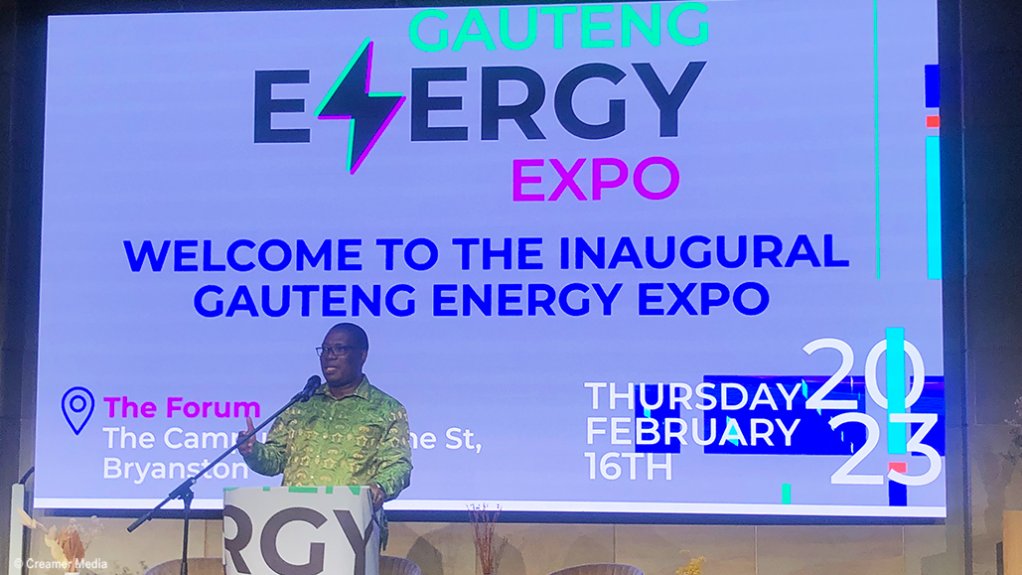Gauteng Premier Panyaza Lesufi has said the time has come to help the poor migrate away from relying on national power utility Eskom for their power needs.
“The majority of the malls in our province have migrated out of the Eskom grid. Many families have migrated out of the Eskom grid, and many institutions are following. But what about the poor, who can’t afford, who also deserve to be supported? We are ready to migrate them and provide them with the necessary support within the shortest possible time,” he said at the inaugural Gauteng Energy Crisis Response Expo, in Johannesburg, on February 16.
The expo, which is the first of what is hoped to be a yearly occurrence going forward, sought to provide a platform for members of the provincial government to engage with other public and private sector stakeholders to find solutions that might alleviate the energy shortage in Gauteng.
Lesufi opened the expo by stating that he was a "chief buyer" and that he wanted to "buy ideas" from those in the private sector who had workable solutions.
“I need products that will take us out of this problem, and I need to do it now. Not tomorrow, and not any other time. If we continue to talk, we are not going to solve this problem. We need those that are ready, those that are prepared to put their ideas on the table. We are ready to engage with you,” he said.
He added that the time for lamenting and pointing fingers was over and that the government was committed to taking decisive action with speed.
“We want to minimise talking and maximise doing. We commit as government to take decisive decisions with speed,” he promised.
Lesufi further stated that the government was committed to protecting its institutions, such as schools, clinics and hospitals, and saving municipalities.
However, South African Local Government Association (Salga) Gauteng chairperson Jongizizwe Dlabathi argued that migrating everyone from the Eskom grid would do more harm than good as it would bankrupt already ailing municipalities who relied on the shrinking income from the sale of electricity to fund various expenses.
“The real consequence of this option is that of a shrinking revenue base for municipalities, making it much more difficult for local municipalities to provide sustainable basic services. Municipalities are further struggling to service some of their current debt obligations, partly because their cash flow is being negatively affected by low electricity sales,” he explained, stating that local municipalities were the major casualties of the energy crisis.
Lesufi, however, believed that joint efforts could turn the energy crisis into a new economy for the province, adding that the crisis was the new Gauteng "gold" that could create jobs and employ thousands of people.
“We believe we can turn this major energy crisis into a new economy. But we don't want people that will take advantage of this crisis and overprice it. We want people that are committed to fairness. We want people that are committed to providing a return on investment from government coffers,” he said.
Dlabathi called on the government to prioritise investment towards optimal energy generation with a view to improving energy availability, including the upgrade and maintenance of the current coal power stations in an effort to normalise the grid.
“Salga also believes that we need to strengthen the distribution infrastructure at a local level. In this regard, we are of the view that we must build a resilient distribution network, especially our substations, which is deteriorating due to the excessive switching because of loadshedding,” he said.
He called for municipalities to be supported through additional grant funding to roll out solar infrastructure, particularly for municipal facilities.
"This can be advanced as part of the intervention and exploiting what has been declared as a state of disaster in terms of energy,” he said.
“We can't just allow a situation where municipalities are becoming more and more vulnerable to the loss of electricity income," Dlabathi said.
Lesufi promised delegates and exhibitors that, after reviewing the solutions presented at the expo and engaging with various stakeholders at the event, the most promising options for solving the energy crisis in Gauteng would be brought before the public in his State of the Province Address on February 20.
EMAIL THIS ARTICLE SAVE THIS ARTICLE ARTICLE ENQUIRY
To subscribe email subscriptions@creamermedia.co.za or click here
To advertise email advertising@creamermedia.co.za or click here











